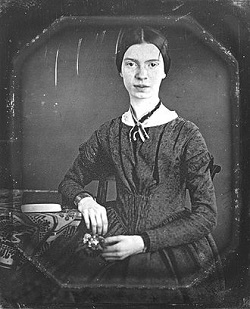 To make Routine a Stimulus
To make Routine a Stimulus
Capacity to Terminate
Is a Specific Grace —
Of Retrospect the Arrow
That power to repair
Departed with the Torment
Become, alas, more fair —
She became more and more of a recluse as her adult life went on. Only a few of her poems were published during her lifetime, and they were heavily edited for more conventional grammar and punctuation. It was only after her death that the almost 1,800 poems she had written were discovered, many of them written in tiny handwriting on small pieces of paper that were bound into “fascicles” (what a great word!), or booklets. A complete but edited version was published in 1890; it was only in 1955 that the poems as written were published.
Anyway, I’m going to explain what I think the poem means and how it relates to happiness. (I seem to be on a poetry analysis tear lately; see my post on William Agee’s “Sure on this Shining Night” over on “Behind the Music.”) I did find a website that purports to explain all of her poems, but I thought the meaning given for this one was pretty preposterous, so I won’t quote it. To me she seems to be saying, ‘In order to make your routine (your day-to-day life) into something stimulating, remember that it can cease. Something can happen to bring those ordinary days to an end.’ (Memoirs about an illness often pinpoint the exact date and time of the diagnosis, when everything changed. For me, the day the doctor called our house saying that Gideon had tumors on his spine, May 14, 2014, at 4:30 PM, will always be when our normal lives stopped.) Normality’s “capacity to terminate,” to end, is actually a grace, a blessing, if you remember it. Then you won’t take it for granted. I don’t know that I can give an exact word-for-word meaning of the last four lines, but you could interpret them as saying something like “when you look back on past torment it can seem fair.” I have said that Gideon’s first week in the hospital, when we weren’t sure what type of tumors he had and what was going to happen to him, was the most horrible week of my life. It was. And it was, in a strange way, the most wonderful–because of its intensity. All I could do was pray, and cry, and hope. And come home from the hospital to feed the cats and water the plants. The mundane was infused with meaning.
Somewhere I read the following, a mother’s words to her grown daughter: “I wish I’d known that the time I had with you kids when you were young was the only real happiness I was ever going to have in my life.” What if that were true of your life today?